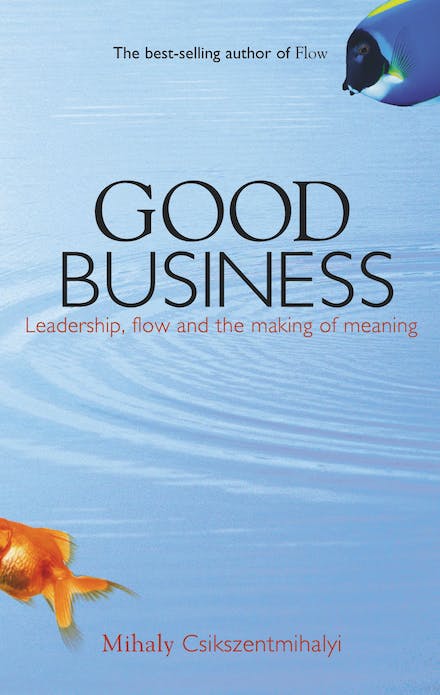In the present time, two categories of individuals hold the clearest title to providing for the material and spiritual needs of the community. But is your faith misplaced?
Prof. Mihály, CSÍKSZENTMIHÁLYI, “GOOD BUSINESS” Leadership, Flow and the Making of Meaning, 2003

As a first step, we should consider what it has meant to be a successful leader in the past so that we can understand better what options the future may hold.
As humans. we cannot survive without hope. When we lack reasons for living apart from the urges that biology has built into our nervous system we soon revert to an animal level of existence; where only food, comfort, and sex matter. By contrast, the remarkable cultures that some of the great world civilizations have occasionally achieved were made possible by two very different prerequisites: a reasonable level of resources and the technology to use them, leading to a material surplus; and a defined set of goals that helped their citizens overcome the inevitable obstacles and tragedies inherent in living. If either of these conditions is absent, life devolves to a selfish scramble; if both are lacking, it becomes utterly hopeless.
Depending on the level of societal development, a particular class of individuals may step forth with the promise of improving the material conditions of the populace, and offer a set of goals for channeling its life energy. If these individuals can make a credible claim for their program, they are likely to emerge as the leaders of society because the rest of the population will agree to follow them. For untold thousands of years, these leaders were typically the best hunters of the tribe, who offered good spoils to their followers, and inspiring stories about the happy hunting grounds thereafter. As technologies of food production and warfare became more advanced, however, groups of warlords and of kings surrounded by courtiers and priests assumed leadership. In some periods the clergy and the nobility-usually made up of great landowners-jointly shared power. More recently merchants and manufacturers have risen to the top of the social pyramid.
In the present time, two categories of individuals hold the clearest title to providing for the material and spiritual needs of the community. The first is scientists, who promise hope through a longer and healthier life, an expansion of our ambitions into the solar system, and eventual control over both animate and inanimate matter. The second and larger group consists of men and women engaged in business, who promise to make our lives more affluent, comfortable, and exciting by allowing market forces to direct production and consumption in the most efficient way, Scientists and business leaders-the elite of the new knowledge workforce-have achieved an eminence reserved in former times for the nobility and the clergy. Those who do not belong to their ranks are nevertheless willing to grant them power and wealth because they believe that society as a whole will ultimately benefit from their efforts. Is this faith misplaced?
Mihaly Csikszentmihalyi, Good Business (book)
The necessity for considering such issues is simple: Today business leaders are among the most influential members of society, While they are all trained to generate profits, many of them are oblivious to the other responsibilities that their new societal leadership entails. In this book (Good Business), visionary leaders will explain what they consider to be their duties and how they go about fulfilling them. In the process of examining their philosophies and their practical applications, we will focus especially on how leaders and managers and even the concerned employees of any organization can learn to contribute to the sum of human happiness, to the development of an enjoyable life that provides incoming, and to a society that is just and evolving
Many business leaders today view their jobs as entailing responsibility for the welfare of the wider community. These individuals do not define themselves as profit-making machines whose only reason for existing is to satisfy escalating expectations for immediate gain. It is to such visionary leaders that my colleagues and I turned, to learn what lessons they may have for others involved in business, as well as for everyone else who lives in these times. What do they consider their mission to be? What do they do to make life better for themselves and for others? Is there hope for society as a whole in the example they provide?
